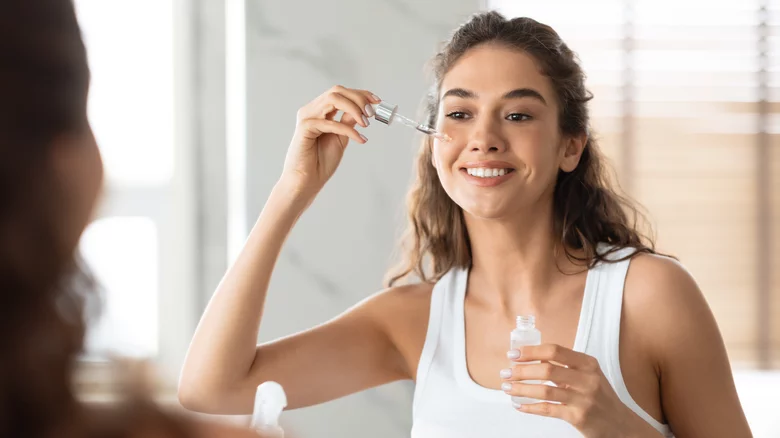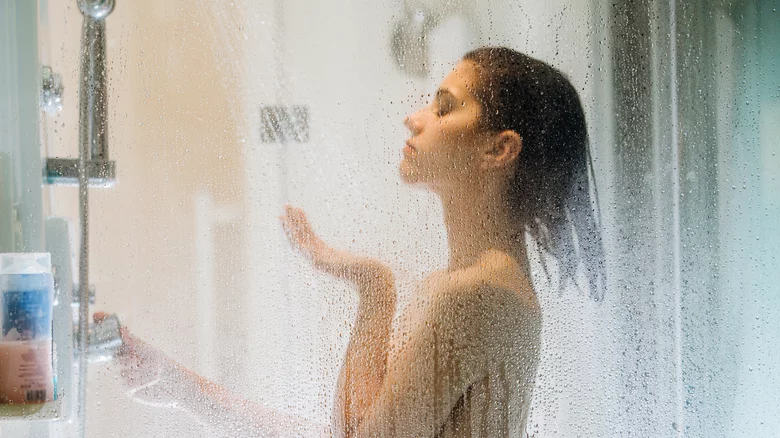People simply can’t stand the sticky feeling of lotion on their skin, others have medical reasons as to why they have to refrain from using it. Many consumers are allergic or have skin sensitivities to certain fragrances, dyes, or preservatives that are commonly used in body and facial lotions, making them unable to use them.
This can cause your skin to no longer pull essential moisture and nutrients that naturally occur in your own body, instead holding out for the replacement moisture that cream hydrators provide. He argues that your body’s own natural hydration is what is really responsible for keeping your skin looking and aging its best. If your skin is sensitive to lotion or its ingredients, or if you simply want to maximize your body’s natural hydration, it’s best to skip the cream altogether.
Try an oil

Having oily skin tends to be unappealing, skincare oils often get a bad reputation and are written off as being pore-clogging and greasy. However, many oils on the market are created to absorb into the skin instead of sitting on top of it and are non-comedogenic, meaning they won’t clog your pores.
Oil is meant to work by repairing your skin’s topmost lipid barrier and locking in moisture, whereas water-based gel moisturizers and serums may evaporate. Paul Jarrod Frank, MD, says oils are even better than creams at locking in hydration without being evaporated. “Water dries the skin, but oils and ointments are the most hydrating.
It gives the skin lasting moisture. As someone with dry, sensitive skin, I do not have to worry about an allergy since this is a very gentle product.”Water dries the skin, but oils and ointments are the most hydrating,” he says. “Lotions go on easy but still don’t hydrate as well.
Plop on a face mask

Acne-prone skin, face masks are a good option for moisturizing if you are afraid of breaking out because they don’t tend to contain any oil. Celebrity esthetician Joanna Vargas (via Byrdie) is also a big fan of using sheet masks to nourish the skin—a pricier option for everyday use but perfect for quick and easy application. Masks might also be better for acne-prone skin because they don’t typically contain oils.
“Some of my favorite ingredients to use are coconut oil, avocado, and honey,” noting that honey, in particular, is the most versatile and is excellent at providing moisture. It’s even a good option for those with acne-prone skin. “Don’t forget the turmeric if you want to add a little bit of anti-aging to the mix.”
Benefits of drinking more water

Drinking enough water is essential in maintaining your skin’s elasticity and leaves you less likely to develop wrinkles, scars, and fine lines over time. Skin naturally loses the ability to retain hydration as your body ages, so ensuring you are drinking lots of water regularly will help give your skin what it needs to remain supple, elastic, and wrinkle-free.
It sounds simple, but ensuring you are staying properly hydrated and drinking plenty of water throughout the day is one of the best things you can do for your health and for your skin,water is essential in maintaining your skin’s elasticity and leaves you less likely to develop wrinkles, scars, and fine lines over time. Skin naturally loses the ability to retain hydration as your body ages, so ensuring you are drinking lots of water regularly will help give your skin what it needs to remain supple, elastic, and wrinkle-free.
How much water someone needs, according to Healthline, experts generally recommend most people drink eight 8-ounce glasses of water every day. Some even insist you should drink water throughout the day, even if you aren’t thirsty.
Your skin’s elasticity, Pure Luxe Medical recommends gently pinching your skin to see if it immediately bounces back into place when you let go. If it doesn’t, your skin is probably dehydrated, in which case you can plump your skin cells back up by drinking more water.
Using a humidifier while sleeping

“It sounds so simple but this trick will work, for both dry skin and acne-prone skin types,” celebrity esthetician Renee Rouleau says via YouBeauty. “When we feel our skin getting drier our first idea is to use a heavier, creamier moisturizer,” she says, which can often lead to clogged pores -– especially with those who tend to have problematic or acne-prone skin.
Running a humidifier in whatever room you spend a lot of time in, such as your bedroom, will help ensure less moisture evaporates from your skin while you are in there. She notes that it’s especially important to regularly use a humidifier during the colder winter months, as constantly running the heat in your house can make the air ultra-dry.
Avoid hot showers and baths

“The heat from the shower softens the skin’s natural oil barrier, and soap washes it away,” she says via YouBeauty. “Without this barrier, skin easily loses moisture, leading to dryness, itchiness and irritation.” She also adds that this can further exacerbate existing issues such as psoriasis and eczema.that spending too much time in hot water can dry out your skin. It might seem counterintuitive that water, the source of hydration, can actually dry out your skin.
Because of the difficulty your skin has locking in moisture when exposed to hot water, Dr. Green suggests taking lukewarm showers and baths instead, being mindful to keep it relatively short if you are concerned about the effects it may have on your skin. To further help your skin retain moisture during and after your bath or shower, Dr. Green recommends investing in a body wash that contains hyaluronic acid, which helps draw water into the skin.



